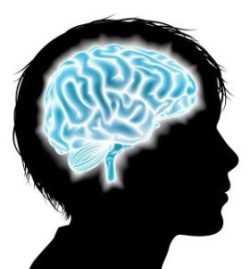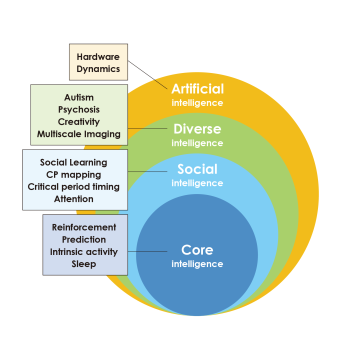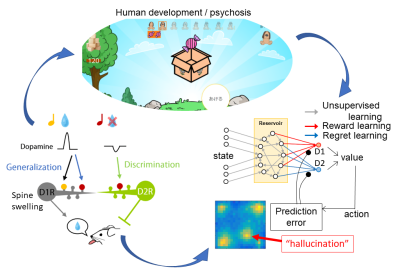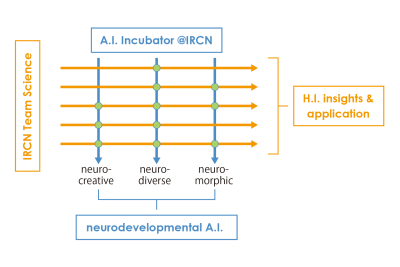Scientific Mission
Neurointelligence for Science and Society
The human brain is the pinnacle of biological evolution in the known universe, and higher brain cognitive abilities continue to surpass those of the largest and fastest supercomputers. As impressive as the brain is, its development is equally complex and mysterious: progressing from a single embryo to millions of synaptic circuit connections in a process that computer science cannot even begin to imagine. Within this dynamic neural network matrix lies the origins of cognition and intelligence. The mission of WPI-IRCN is to understand the core principles of brain development and leverage that knowledge to build a hybrid field of human and novel artificial intelligence called neurointelligence.

Exploring the Origins of Human Intelligence
The Child Brain: a Biological Learning Machine How does human intelligence arise? The answer lies in the myriad neural circuits that emerge in the developing brain. The capacity for intelligence begins with neural stem cells that power prenatal brain development and their genetic and epigenetic control. Next is the elaboration of neural processes that define the synaptic microcircuits and their precise structural plasticity. Early sensory experience then actively sculpts these circuits during circumscribed temporal windows called critical periods that help to crystallize the network. Finally, the child’s social and cultural environment consolidates higher cognitive functions like language, learning, and memory. Not surprisingly, brain development trajectories can go awry at any of these stages, resulting in disorders that may impair cognition. WPI-IRCN seeks to explore novel principles of brain development and function from these diverse perspectives and then apply them to benefit society.
Navigating the Landscape of Intelligence Research
Layered Structure of Intelligence Human intelligence (H.I.) comprises three concentric categories formed naturally by brain evolution. Core Intelligence consists of the brain's ability to perform basic cognitive functions like learning from experience, predicting the environment, and generating spontaneous activity. These core functions allow individuals to interact and support Social Intelligence through attention to others, shared experience during early critical periods, and social learning. Social and Core Intelligence define the normal range of cognition, which in humans may span a broad spectrum of capacities – from creativity to psychiatric conditions – an added dimension called Diverse Intelligence. From there, Artificial Intelligence (A.I.) is a stage beyond natural human intelligence, enabling H.I. to acquire additional capabilities to better shape our future.
Opening Frontiers via Interdisciplinary Collaboration
Creating Research Field Fusion through Team Science The mission of WPI-IRCN requires an integration of the natural sciences, social sciences, medicine, mathematics, engineering, and computation/information science, seamlessly linking fundamental research on the development of neural circuits and their advanced measurement technologies to drive brain development-inspired A.I. research. WPI-IRCN convenes researchers from all these disciplines who work together in a Team Science collaboration framework to facilitate interdisciplinary research with applied innovation and find solutions to human and clinical goals. Each team is self-governing and coordinated by center leadership, tackling ambitious and complementary research projects in human intelligence. WPI-IRCN brings together faculty and postdoctoral fellows from the University of Tokyo with researchers from partner institutions worldwide.

Strengthening Society One Brain at a TimeCollaboration
Neural Development-Inspired Applications Team Science-driven research applications are emerging along two principal axes: human intelligence, including discovery and hypothesis-driven science for clinical and social benefits, and neural development-inspired A.I., based on a synthesis of computational algorithmic engineering, incorporating insights from the child's brain. WPI-IRCN's overarching innovation mission is the creation of a neurointelligence ontology for human wellness and happiness with the resilience to solve society's significant challenges. A large part of this goal will be predicting and alleviating debilitating brain disorders. WPI IRCN is building the foundation for a new generation of brain development–inspired A.I. technologies.


